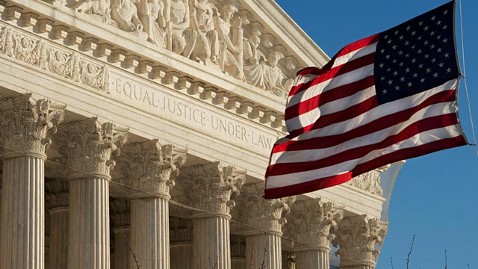Supreme Court Due for Some Big Decisions

(Image Credit: Paul J. Richards/AFP/Getty Images)
The challenge to the Affordable Care Act has dominated this Supreme Court term, and is not expected to be decided before the end of June. But there are several other compelling cases that will be decided in the coming weeks.
FCC v. Fox: Fleeting expletives and partial nudity
The court will decide whether the federal government's policy for regulating indecency over the public airwaves during prime time is unconstitutional. The case stems from celebrities such as Cher and Nicole Richie who cursed on live television, as well as an episode of ABC's "NYPD Blue" that depicted partial nudity.
The Federal Communications Commission (FCC), which is charged with regulating the public airwaves, found that the incidents violated its prohibitions against the broadcast of indecent material before 10 pm.
But lawyers for broadcasters such as Fox and ABC argue that the FCC's policy is unconstitutionally vague and chills free speech. Facing daunting fines, the broadcasters argue that the government should no longer treat broadcast speech more restrictively than other media when it comes to the regulation of indecency over the airwaves.
Justice Sonia Sotomayor is recused from this case because she dealt with the issue as a lower court judge.
U.S. v. Alvarez: Stolen Valor Act
The court will decide whether the Stolen Valor Act, a 2006 law that makes it a crime to lie about receiving military awards, is unconstitutional. The law is challenged by Xavier Alvarez, who, while serving as a public official in California, introduced himself to an audience by saying, "I'm a retired Marine for 25 years. I was awarded the Congressional Medal of Honor."
Alvarez, one of the first people prosecuted under the law, had never even served in the military. His lawyer admits that Alvarez is a liar, but says the Stolen Valor Act goes too far and violates the First Amendment right to free speech. The government stresses the law fits into a narrow category of speech that is unprotected by the First Amendment.
Reichle v. Howards: Lawsuit against former Vice President Cheney's security detail
The Supreme Court will decide whether to allow a lawsuit, which was filed against two Secret Service agents charged with protecting Vice President Cheney in 2006, to go forward. A Colorado man, Steven Howards, approached the then-vice president at a public event and took the opportunity to confront Cheney about the administration's Iraq policy. Howards walked up to Cheney and said that his "policies in Iraq are disgusting," and then left.
But Secret Service agents saw things differently. They said Howards touched Cheney's right shoulder with an open hand. The agents engaged Howards for questioning and he initially proved uncooperative and denied having touched the former vice president. The agents arrested Howards and turned him over to local police. Although state charges against Howard were eventually dropped, he is now seeking to sue the agents for monetary damages in their personal capacity.
He alleges that the agents arrested him in retaliation for his exercising his First Amendment rights. The agents claim they have immunity from such suits and that they had probable cause to arrest Howards partly because of "unsolicited physical contact" with the vice president. Justice Kagan is recused from the case because she dealt with it in her previous job as solicitor general.
Miller v. Alabama and Jackson v. Hobbs: Life without parole for juveniles?
The Supreme Court has rejected the death penalty for juveniles, and it has said that juveniles who commit non-homicide offenses can no longer receive sentences of life without parole. Now it will address whether juvenile murderers - 13 and 14 year olds - should receive sentences of life without parole. The court heard two cases regarding sentences of life without parole applied to offenders who were 14 years old at the time of the crime. Evan Miller beat a neighbor and then set his trailer on fire so that the man burned to death. Kuntrell Jackson took part in a murder that occurred in 1999 less than three weeks after his 14th birthday. Jackson didn't pull the trigger, but he was charged as an adult.